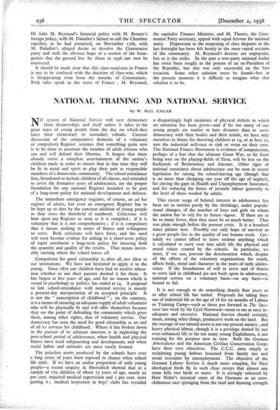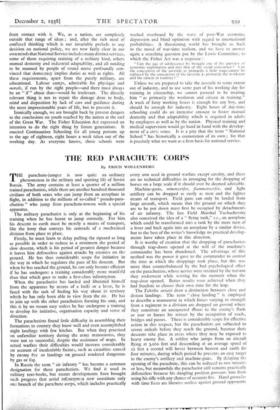NATIONAL TRAINING AND NATIONAL SERVICE
By W. McG. EAGAR
NO system of National Service will save democracy from dictatorships and itself unless it takes in the great mass of young people from the day on which they leave their elementary or secondary schools. Current discussion of the comparative demerits of a voluntary or compulsory Register assumes that something quite new is to be done to ascertain the number of adult citizens who can and will defend their liberties. It forgets that there already exists a complete ascertainment of the nation's children made in order to ensure that in due time they will be fit in mind and spirit to play their part as responsible ' members of a democratic community. The school attendance lists, broadened to include children of all classes, and extended to cover the formative years of adolescence, are the proper foundation for any national Register intended to be part of a long-term policy for national development and defence.
The immediate emergency requires, of course, an ad hoc register of adults, but even an emergency Register has to be kept up to date by the constant addition of young people as they cross the threshold of manhood. Criticisms will beat upon any Register as soon as it is compiled ; if it is voluntary that it is not comprehensive ; if it is compulsory that it means nothing in terms of fitness and willingness to serve. Both criticisms will have force, and the need will soon become evident for adding to a short-term policy of rapid enrolment a long-term policy for insuring both the quantity and quality of the results. That means inevit- ably starting where the school leaves off.
Compulsion for good citizenship is, after all, not alien to our institutions. We have not hesitated to apply it to the young. Since 1870 our children have had to receive educa- tion whether or not their parents desired it for them. It has begun at five years of age, and for no reason which is sound in psychology or politics has ended at 14. A proposal to link school-attendance with national service is merely a present-day interpretation of an accepted principle. It is not the " conscription of childhood " ; on the contrary, it is a means of ensuring an adequate supply of adult volunteers who will be physically fit and will offer themselves because they see the point of defending the community which gives them, among other rights, that of voluntary service. Our democracy has seen the need for good citizenship as an end of all its services for childhood. Where it has broken down in the pursuit of its ultimate interests is in neglecting the post-school period of adolescence, when health and physical fitness most need safeguarding and development, and when social habits and attitudes are most surely formed.
The priceless assets produced by the schools hive over a long series of years been exposed to chance when school life ends. If we have an undue proportion of unfit young people—a recent enquiry in Shoreditch showed that in a sample of 179 children of about is years of age, nearly 20 per cent. required medical supervision and r per cent. were getting it ; medical inspection in boys' clubs has revealed a disquietingly high incidence of physical defects to which no attention.. has been given—and if far too many of our young people are readier to hate dictators than to serve democracy with their bodies and their minds, we have only ourselves to, blame for throwing children at 14, or at best 15, into the industrial mill-race to sink or swim on their own. The National Fitness Movement is evidence of compunction, perhaps of a fear that the ultimate Great War, so far from being won on the playing-fields of Eton, will be lost on the backyards of Bermondsey and Ancoats. Other signs of national uneasiness about adolescence can be seen in recent legislation for raising the school-leaving age (though that is no more than chopping one year off the age of neglect), for closing the gaits in Health and Unemployment Insurance, and for reducing the hours of juvenile labour generally to the level of those worked by adults.
This recent surge of belated interest in adolescence has been set in motion partly by the shrinkage, under popula- tional changes, of the number of boys and girls on whom the nation has to rely for its future vigour. If there are to be so many fewer, then they must be so much better. That was plain enough before the present crisis. It is a hundred times plainer now. Possibly our only hope of survival as • a great people lies in the quality of our human stock. Cer- tainly we cannot afford to leave undone anything which is calculated to carry over into adult life the phygical and moral values created by the schools. In particular, we must, if we can, prevent the deterioration which, despite all the efforts of the voluntary organisations for youth, affects body, mind and character in the years of early adoles- cence. If the foundations of will to serve and of fitness to serve laid in childhood are not built upon in adolescence, national service on a voluntary basis—on any basis—is bound to fail.
It is not enough to do something drastic four years or so after school life has ended. Proposals for taking boys out of industrial life at the age of 18 for six months of Labour or Training Cainp—such as those put forward in The Spec- tator last week by Sir Cyril Norwood—seem to me at once in- adequate and excessive. National Service should certainly mean, among other things, productive work on the land. But the wastage of our natural assets is not our present anxiety ; and heavy physical labour, though it is a privilege denied by our over-urbanised life, to far too many young Fnglishmen, is not training for the purpose now in view. Both the German Arbeitsdienst and the American Civilian Conservation Corps have their own objectives. The C C C aims simply at reclaiMing young hoboes loosened from family ties and social restraints by unemployment. The objective of the German Labour Service is much more complex, for Nazi ideological birds fly in such close coveys that almost any stone kills two birds or more It is strongly coloured by Herr Hitler's mystical sense. of the Germans as an' auto- chthonous race springing from the land and drawing strength from contact with it. We, as a nation, are completely outside that range of ideas ; and, after the rich meal of confused thinking which is our invariable prelude to any decision on national policy, we are now fairly clear in our own minds that National Service includes many distinct services, some of them requiring training of a military kind, others manual dexterity and industrial adaptability, and all needing to be manned by people of sound nerve profoundly con- vinced that democracy implies duties as well as rights. All these requirements, apart from the purely military, are educational. Labour camps, admirable for physique and morale, if run by the right people—and there must always be an " if " about that—would be irrelevant. The directly relevant thing is not to repair the damage done to body, mind and disposition by lack of care and guidance during the most impressionable years of life, but to prevent it.
Ironically enough, we are brought back by present dangers to the conclusions on youth reached by the nation at the end of the Great War. The Fisher Education Act expressed an intention to do the right thing by future generations. It enacted Continuation Schooling for all young persons up to the age of eighteen, eight hours a week taken out of the working day. As everyone knows, those schools were onomi washed overboard by the wave of post-War ecc. depression and blind optimism with regard to international probabilities. A threatening world has brought us back to the mood of war-time realism, and we have to answer again a searching question put by the Lewis Committee, to which the Fisher Act was a response :
" Can the age of adolescence be brought out of the purview of economic exploitation and into that of the social conscience ? Can the conception of the juvenile as primarily a little wage-earner be replaced by the conception of the juvenile as primarily the workman and the citizen in training ? "
Unless we are prepared to take the juvenile to some extent out of industry, and to use some part of his working day for training in citizenship, we cannot pretend to be treating him " as primarily the workman and citizen in training." A week of forty working hours is enough for any boy, and should be enough for industry. Eight hours of day-time schooling could do an immense amount to foster manual dexterity and that adaptability which is required in adults by employers as well as by the nation. Physical training and medical supervision would go hand in hand with the develop- ment of a civic sense. It is a pity that the term " National School " has historically a connotation of its own ; for that is precisely what we want as a firm basis for national service.



























































 Previous page
Previous page